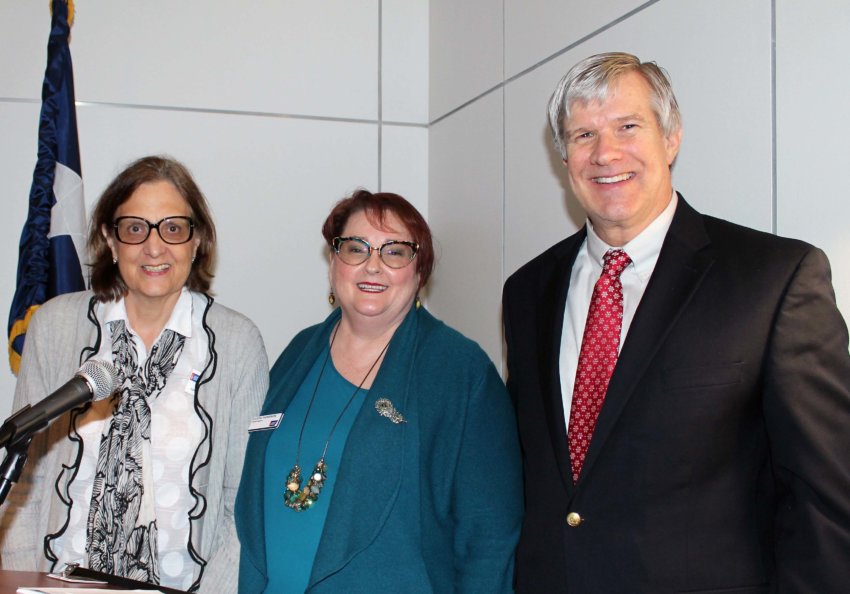“I only wonder how my life would have been different if I’d had the HPV vaccination,” said Liz Kapeel, 27, a graduate of Texas State University who now works in Austin. The young woman was diagnosed with cervical cancer at age 25 and has received extensive treatment.
She described her experiences at the “2019 HPV Vaccine Symposium: Attacking HPV from Every Angle,” sponsored by the American Cancer Society and held Feb. 15 at UT Health San Antonio MD Anderson Cancer Center. (HPV stands for human papilloma virus.)
“I lost my fertility, I had early menopause at 25 years old, I take hormone replacement therapy to prevent me from having hot flashes, and I have huge anxiety and PTS (post-traumatic stress) from this experience, not to mention financial devastation,” Kapeel explained, from several years of seeking an accurate diagnosis and treatment.
More than 70 health care professionals and members of the public attended the event that featured five local panelists including Gail Tomlinson, M.D., Ph.D., and Michaell Huber, D.D.S., from UT Health San Antonio.
Overview of HPV and cervical cancer
Dr. Tomlinson, professor of pediatrics, chief of the Division of Pediatric Hematology/Oncology and co-director of the Population Science and Prevention Program at UT Health San Antonio MD Anderson Cancer Center, gave an overview of human papilloma virus. She said, “Over the past 20 to 30 years, many different types of HPV have been discovered. Most people get the virus as young adults through sexual contact. Many people carry the virus in their body, but most of them will clear it from their system.
“Because the virus itself causes no symptoms, most people don’t know they have it. The most dangerous types are HPV 16 and 18 that cause about 70 percent of cervical cancer,” Dr. Tomlinson said, adding that the HPV vaccination can prevent more than 90 percent of these cancers.
Hispanic women are at a higher risk than non-Hispanic women for developing some HPV cancers including cervical cancer, she said. Pap smears are the best way to detect cervical cancer, but there are no screenings currently for other cancers caused by HPV including anal, vulvar, penal and oropharyngeal cancers.
The HPV vaccination can be given to girls and boys beginning at age 9. The best protection results when a two-shot vaccination course is given before age 15, with the second vaccination in the series occurring six months to one year after the first dose, she said. In October, the Food and Drug Administration approved expanding vaccinations up to age 45 for men and women. People ages 15 through 45 would need to receive a three-dose vaccination series, she said.
HPV-related oropharyngeal cancers rising
in his presentation, “HPV-Associated OPC: A Preventable Cancer,” Dr. Huber said that research has shown that there has been an uptick in recent years in the number of cases of oropharyngeal cancer related to HPV. “Oral sex is the major contributor to the disease,” said the professor of oral medicine in the School of Dentistry.
Symptoms include difficulty swallowing, sore throat and earaches. “HPV-associated OPC is often discovered at a more advanced stage compared to traditional tobacco- and alcohol-associated oral cancer,” he said, noting that it is often difficult for dentists or ear nose and throat specialists to see this type of cancer. Imaging is often necessary to identify its presence. Once discovered, HPV is usually treated with radiology and chemotherapy. “Radiology can cause the salivary glands to be destroyed, causing lifelong problems with dry mouth,” Dr. Huber said.
He said that oropharyngeal cancer is preventable. Although the FDA has not yet approved the HPV vaccination as a prevention for oropharyngeal cancer, the American Dental Association in 2018 adopted a policy urging dentists to recommend HPV vaccination.
Letitia Thompson, M.P.P.A., vice president of the American Cancer Society’s South Region and mistress of ceremonies for the event, added that the American Cancer Society is currently rewriting its recommendations on HPV vaccination and oropharyngeal cancer because of recent research.
Both Drs. Tomlinson and Huber as well as the other speakers, including Juan Parra, M.D., M.P.H., director of pediatrics at CentroMed, and Brittani Ray, management analyst and vaccine educator for the San Antonio Metropolitan Health District, noted that health professionals are often not comfortable discussing HPV vaccination with their patients and young patients’ parents because of its connection to sexual activity. However, all agreed that these conversations are essential, especially because the HPV vaccination can prevent more than 90 percent of HPV-related cancers.


